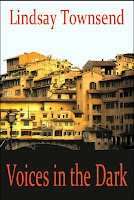‘Song
at Dawn’
Winner
of the Global Ebooks Award 2012 for Best Historical Fiction (Medieval)
'Believable,
page-turning and memorable' - S.P.Review
On the run from abuse, Estela wakes in a ditch with
only her lute, her amazing voice, and a dagger hidden in her petticoats. Her
talent finds a patron in Aliénor of Aquitaine and more than a music tutor in
the Queen's finest troubadour and Commander of the Guard, Dragonetz los Pros.
Weary of war, Dragonetz uses Jewish money and Moorish expertise to build that
most modern of inventions, a papermill, arousing the wrath of the Church. Their
enemies gather, ready to light the political and religious powder-keg of
medieval Narbonne.
FREE
FOR CHRISTMAS until 24th December - spread the word!
Use coupon FF49C when you
checkout
If you can find the time to
post a review, it would be much appreciated. Jean likes to hear from readers,
so contact her with questions or comments, at
jean.gill@wanadoo.fr
‘Song
at Dawn’
Extract
from Chapter 7
1150
Dragonetz is Commander of the Guard and Troubadour to Aliénor (Eleanor) of
Aquitaine, Queen of France, and Estela is the mystery
girl Aliénor has required him to tutor. In this part of the story he is showing her his secret
building project, a paper mill. At this time in Europe, only the Moors had the
skills to make paper.
‘That,
my sweet Estela, is the beauty of it! I shall sell paper to the Church for enormous profit
and I shall be fantastically rich! As shall my workers.’
Estela
chewed the side of a finger, a bad habit she had kept from childhood. ‘The
Church won’t like it,’ she stated.
‘No,
they won’t.’
‘That
makes a dangerous enemy.’ Estela stated the fact.
‘We’ve
told him,’ Raoulf was gloomy. ‘But you can see what he’s like. The future pff!’
and he spat, coarsely. ‘The future will be my Lord’s body with a bolt through
it!’
‘Ever
the optimist!’ Dragonetz clapped Raoulf on the back. ‘That’s what you’re here
for, you and your men, to watch my mill and watch my back. Speaking of which,
this should make things even.’ With which enigmatic statement, he tore off his
doublet and underthings so that he too was bare to the waist, then he grabbed Arnaut’s
hand and dragged his unwilling man into a run. Shouting, ‘I said I owed him a
ducking,’ Dragonetz ran the two of them straight off the edge of the bank into
the river.
‘You
mad whore-son,’ burst from Raoulf as he rushed after them to the bank,
anxiously scanning the murky water for signs of life. Estela counted to thirty
before two heads burst up above the surface, gasping, spouting and followed by
thrashing arms. Arnaut twisted underwater, avoiding Dragonetz’ attempt to duck
him again and came up at a safe distance, both men treading water and
spluttering. ‘Come and join us, Estela,’
Dragonetz called to her.
‘Can’t
swim,’ she yelled back.
‘What
are you thinking of, bringing a Lady here!’ Raoulf shouted, purple with
annoyance.
‘A
Lady! I’d forgotten!’
‘Oh
my God, no,’ groaned Raoulf.
‘Estela,
my sweet, Arnaut wants to do combat and regain his pride – throw us a token.’
Without
thinking, Estela pulled the bangle off her arm and threw it in a high arc to
land equidistant from the two men. Neither wasted words but dived underneath,
rippling the surface as they carved the water underneath. Another count,
thirty, forty, Estela thought that Raoulf would explode, holding his own breath
to see how long it was possible, then Arnaut broke surface, gasping, followed
quickly by a triumphant Dragonetz whooping and waving the bangle in the air.
‘She’s
not an ordinary Lady,’ he yelled, ‘she’s a Troubairitz! Ask her!’ And then he
struck out for the bank, Arnaut following at a safe distance and after some
horseplay with Dragonetz trying to prevent Arnaut getting out the water, both
men stood dripping and laughing, pushing each other. Dragonetz
waved the bangle, taunting, and Arnaut stood, bent double, getting the words out
with difficulty. ‘You
always have to win, don’t you, even when you don’t want the prize!’
Dragonetz’
eyes glittered. ‘Always, Arnaut, always,’ and then he knelt in front of Estela,
offering her the bangle back. She looked down on the black curly hair, bent in mock
homage, the broad, wet shoulders, the long tapered fingers reaching out to her,
returning her token. She
felt Arnaut’s stillness, the sunshine, the moment to which this day had been
leading all along. She thought of Peire, his disappointment over something so
small, so easily given, so wrongly with-held. It was her moment and she could
do anything she liked with it. She shut her eyes and felt for the lyric. If this
were a song, how would it go? And then she knew what to do.
Want
to read more ?
FREE FOR CHRISTMAS until 24th December
Use coupon FF49C when you
checkout
If you can find the time to
post a review, it would be much appreciated. Jean likes to hear from readers,
so contact her with questions or comments, at
jean.gill@wanadoo.fr
ENTER
THE DRAW FOR A SIGNED PRINT BOOK VERSION
About the author:
Jean Gill is a Welsh writer and photographer living in
the south of France with a big white dog, a Nikon D700 and a man. For many
years, she taught English in Wales and was the first woman to be a secondary
headteacher in Carmarthenshire. She is mother or stepmother to five children.
Publications are varied, including prize-winning
poetry and novels, military history, translated books on dog training, and a
cookery book on goat cheese. With Scottish parents, an English birthplace and
French residence, she can usually support the winning team on most sporting
occasions.











